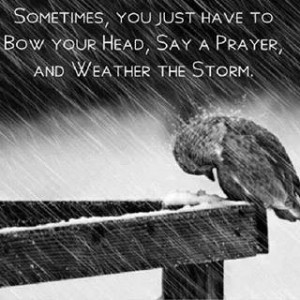 from past traumatic experiences or it can simply be based on a perceived danger (ex. if this happens then I could be hurt). Fear can be generally defined as a natural, emotional defense mechanism, relating to an identifiable object, event, or circumstance in our lives. Simply put, fear is both a natural and learned response to the world around us.
from past traumatic experiences or it can simply be based on a perceived danger (ex. if this happens then I could be hurt). Fear can be generally defined as a natural, emotional defense mechanism, relating to an identifiable object, event, or circumstance in our lives. Simply put, fear is both a natural and learned response to the world around us.
Is fear ever healthy? Sure, rational fear of an identifiable object like fire, electricity, and tornados are all examples of an appropriate response to environmental dangers (I particularly don’t like spiders)!
All of God’s creatures have a built in natural defense mechanism relating to fear. God has given us the natural desire to “flee” apparent danger for our protection.
When does fear become unhealthy? Many times in our lives, we fail to put our feelings of fear into a proper Biblical perspective. The natural emotion of healthy fear grows into an unhealthy fear, anxiety, or phobia, when we fail to “take thoughts captive in obedience to Christ” (2 Corinthians 10:5).
The thought process can go in many different directions. For example, we experience a very real, natural fear toward a specific object or event. Then as time goes on, we begin to relate this natural fear to inanimate objects or to events which may or could possibly happen in the future.
As we fail to distinguish between real and perceived danger, we began to develop a very unhealthy emotional fear in our lives. This fear can become overwhelming because now it is no longer based on reality! At this point, we become victims of our own thought life and we cannot distinguish between real and perceived danger.
For example, let’s say I was burned by fire as a young man. Because of the intense physical and emotional pain of the real life event I experienced, the intensity of emotion related to fire has been greatly increased. Over the years, I allow my fear of fire to grow so strongly that I now have an overwhelming fear associated with anything related to fire (gas grills, lighters, electric heaters, etc.). I might even feel overwhelming feelings of fear when I see a fire on television or hear about one on the radio. Even a passing fire truck can now cause my pulse to race and my heart to leap in my chest.
My natural fear of fire has now developed into an unhealthy, unnatural fear, because it is no longer based on reality. I have traded a natural, God given fear for an unnatural, emotionally crippling anxiety or phobia because I have failed to put my feelings of fear into proper perspective.
How can I overcome fear? May times, the answer to this question may depend entirely on the level and particular source of the fear itself. First, take a moment to relax and reflect on the source of the fear. Is my fear real (a specific object or event) or is it imagined (thinking about trouble that could come or problems that might happen in the future)?
Fear based on a real event, object, or particular circumstance is probably the most easily identified. Within Christian therapy, we can reason through many possible alternatives, thereby lessening the intensity of emotion. As the level of emotion decreases, so will our distress related with the fear itself.
Fear based on intangible objects or imagined danger can be more difficult to overcome without outside support. This type of fear leads to anxiety and phobias because it cannot be effectively reasoned away in our minds. We feel “overwhelmed” and unable to cope with the fears of life because these fears have grown beyond our ability to place them is a proper, realistic perspective. In all cases, God has provided in His word and in His church a very present source of help in a time of trouble and we all should partake of this gift to help in our daily lives.
Donaldson Christian Counseling, Inc. is dedicated to helping people deal with their difficult life issues, like fear. If we can help, please contact us online.
David R. Donaldson, Ph.D.

